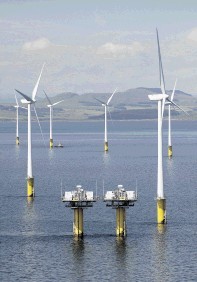
On July 25, the UK Government announced its decision to follow Scotland’s lead and set its own onshore wind band at 0.9 ROCS. This decision is to be welcomed, but I am concerned at London’s decision to only set this band for one year, until 2014, and immediately review it, risking yet more uncertainty for the industry and potentially discouraging investors.
Onshore wind needs certainty to enable it to make investment decisions, which is why, last month, the First Minister wrote to Ed Davey to indicate that the Scottish Government will keep its onshore wind band at 0.9 ROCS for the next four years. If any evidence is produced which triggers a review of that band, we will consider such material as and when it becomes available.
The Scottish and UK Governments share objectives in energy policy. We agree there should be development of the renewable energy potential in these islands and in particular off our coasts. We agree there should be major shift to low carbon energy, and agree there must be incentives for investors to create this seismic change in energy policy – both in generating electricity and heat. We agree that the costs to consumers must be proportionate and that there must continue to be base-load generation.
In Scotland, we have, we believe, created confidence in the energy sector by our clear commitment to renewables, whilst recognising that traditional thermal generation will continue to be needed.
In June, when giving evidence to the Economy, Energy and Tourism Committee in the Scottish Parliament, I argued that the current plans by the UK for electricity market reform (EMR) in their draft Energy Bill needed to be rethought if they are to allow us to achieve these objectives shared in common. Last month, my criticisms have been repeated by the UK Energy and Climate Change Select Committee.
In fact, anyone who reads their initial critique of the draft Energy Bill will see that they are no less than a scathing indictment of the plans, and in particular of the UK Treasury. The committee chairman, Conservative MP Tim Yeo, has said that the committee must prevent the UK Government “messing up” these plans.
The report opines that the UK current plans are unworkable, possibly unenforceable, likely to drive off investment to other EU states and likely to add to electricity bills of all consumers and to do so unnecessarily.
This is a withering criticism of the UK Government.
What is more, the current plans will potentially subsidise nuclear – or new nuclear power stations – to a massive extent, something which in itself has been criticised by influential industry players. These plans risk falling foul of EU State Aid laws, since nuclear is not a new method of producing electricity and therefore should not require subsidy, unlike the nascent and vital wave, tidal and offshore wind methods of generating renewable electricity. The subsidy for nuclear risks endangering the whole package, and is wholly misguided.
At the core of the criticism is that investment will be scared away from the UK. Given that if we are to achieve shared energy policy north and south of the border it is essential to attract and secure investment, this criticism must be addressed.
The levy control framework is flawed. The capacity payment proposals are inadequate. The lack of a state-backed counterparty – something originally implied by earlier consultation documents but which the Committee believe that Treasury instructed DECC to change – is described by Yeo as something which arose because of “arcane theological” arguments as to what constitutes government debt.
We in the Scottish Government were pleased to persuade London that we should play a major part in shaping this legislation and we are keen to continue to work with them constructively.
Part of that is to voice criticisms which are shared by virtually all the serious players in both industry and investment circles. Like the Committee, we believe that EMR can be made to work – though difficult as a task it is not impossible.
However, the UK Government must be ready to recognise the criticisms made by us, the Committee and the industry as pertinent and well intended, and work together to deliver a system which does encourage the massive investment which will be necessary to keep the lights on now and in five and ten years to come.
Fergus Ewing is Minister for Energy, Enterprise and Tourism at the Scottish Government
Recommended for you
